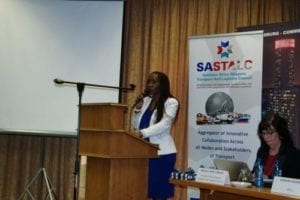Penny Bologo, customs operations executive at SARS, spoke about looming customs control Acts and other initiatives to improve the movement of goods across borders during the 3rd Logistics Business Breakfast.
She said around four million TEUs arrive in South Africa per annum, with 2,7 million of those processed in Durban. In 2012, SARS was voted by the World Bank as one of the most improved customs administration bodies, as a result of the modernisation process that began in 2010. Bologo says the processing time for entries submitted to customs is a remarkable seven seconds and “No intervention – Bills of Entry” can be processed from anywhere in the world. Bologo suggested the Customs Control Bill/Customs Control Act will bring with it a lot of changes, in line with global customs modernisation. SARS Commissioner, Tom Moyane, will meet with SAAFF in October in Durban at the annual SAAFF congress, where the roll out of the Act will be explained. The modernisation of customs processes positively impacts economic growth and improves international trade. Automated processes, electronic declarations and mobile inspections have simplified procedures and reduced paper usage considerably. Administrative burdens have also been reduced, as no supporting documents are required, unless requested. Customs now receives advance information about consignments from traders and can assess risks in advance, using third-party data verification tools.The roll out of the new Customs Act will be done in seven phases, the first phase being licensing, registration and accreditation. More details will be revealed in the aforementioned congress, to be attended by Moyane. Software business partners have been engaged with as part of the implementation process and to ensure alignment.
Bologo said SARS group executive of Customs, Rae Cruikshank, was in Mozambique to discuss the One-Stop Border Post (OSBP) at Ressano Garcia/Lebombo. Other countries in the region, like Botswana, are also under OSBP consideration. SARS is also in data sharing talks with SACU and SADC countries. South Africa is currently sitting on 99%, meaning that almost all transactions are electronic. A testing project with Swaziland is ongoing, which will greatly reduce miss-declarations and fraud, once the necessary legalities are ironed out. Other projects currently underway include the container scanner, which was unveiled in Cape Town recently. A Beitbridge container scanner is to be introduced at the end of the year. Contact centres have been introduced to handle large volumes coming in through the customs system, which relieves customs officers from spending time on the phone. The contact centres will also be used when the new Customs Act is in effect. The registration process will also be going onto an electronic platform in the very near future, and there will be forums for public-private engagements.






